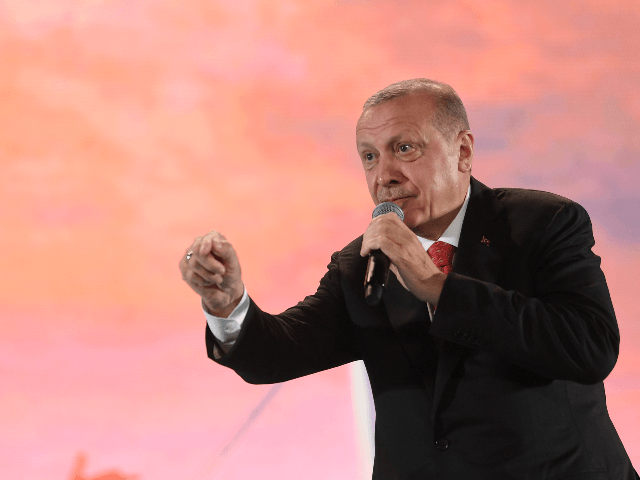Turkish President Recep Tayyip Erdogan threatened to withdraw his ambassador from Abu Dhabi on Friday as retribution for the United Arab Emirates (UAE) establishing diplomatic ties with Israel this week.
Crown Prince Mohammed bin Zayed, President Donald Trump, and Israeli Prime Minister Benjamin Netanyahu announced the deal Thursday, which will result in the full normalization of relations between the two countries, including the exchange of ambassadors and, critically, UAE accepting the legitimacy and sovereignty of the Israeli state. This would permit Israeli citizens to use their passports to travel to UAE and vice versa.
The leaders hailed the move as a historic diplomatic breakthrough and Trump expressed hope that other Arab states would follow in recognizing Israel.
The move infuriated Palestinian leaders and their supporters in Islamist states like Iran and Turkey. The government of Saudi Arabia, a close ally of the UAE and steward of the holiest sites in Islam that has never accepted Israel’s legitimacy as a state, has not weighed in officially on the diplomatic ties at press time.
Erdogan, whose Islamist Justice and Development Party (AKP) has prioritized support for Palestinian groups, was among the first world leaders to aggressively condemn the UAE for establishing ties with Israel. Speaking to reporters on Friday, the president warned Abu Dhabi that in gaining Israel as an ally, it may lose Turkey.
“We may take steps to suspend diplomatic ties with the UAE or withdraw our ambassador,” Erdogan said, according to the Turkish state news agency Anadolu.
“The move against Palestine is not a step that can be stomached. Now, Palestine is either closing or withdrawing its embassy. The same thing is valid for us now,” Reuters added Erdogan as saying.
Some Islamic countries and their allies recognize Palestine as a state separate from Israel. The United Nations has also offered Palestine a position similar to that of full-fledged states, though it has declined to do so for more fleshed out federal governments like that of Taiwan.
Erdogan’s threat followed a harsh statement from the Turkish Foreign Ministry asserting that the agreement between the UAE and Israel had “no credibility” because it did not involve Palestinian leaders.
“The UAE, which is pursuing secret ambitions over a US plan that is stillborn and null and void, ignores the willpower of Palestine. With that being the case, there is no credibility in presenting the trilateral declaration as a support to the Palestinian cause,” the statement read. “Neither history nor the collective conscience of the region will ever forget and forgive the hypocritical behavior of the UAE, which is trying to depict the deal as a sacrifice for Palestine, when in reality it is a betrayal to the Palestinian cause for its own narrow interests.”
Ibrahim Kalin, a spokesman for Erdogan, decried the move on Friday as “miserable.”
“Their miserable policies will not deter but give only strength to those who believe in justice, freedom and nobility. Turkey will continue to stand by the Palestinian people,” Kalin wrote on Twitter, according to Anadolu.
Similarly toned responses erupted throughout the Islamic world. As the pro-Erdogan Turkish newspaper Yeni Safak reported, the International Union for Muslim Scholars (IUMS) called the peace agreement “high treason.” The Palestinian terrorist organization said the UAE’s normalization of ties with Israel was “a stab in the back of the Palestinian cause.” Mahmoud Abbas, the head of the Palestinian Authority, similarly called the move “aggression,” though its objective was precisely to avoid kinetic conflict, and a “betrayal” of the Palestinian people.
The Palestinian Authority previously had a diplomatic representative in UAE, which it announced it would now withdraw.
The Islamic regime in Iran, traditionally an adversary of the Sunni Arab Gulf states, expressed outrage at Abu Dhabi for recognizing Israel.
“History will reveal how this strategic mistake by the Zionist regime and this act of backstabbing by the Emirates against the Palestinians and, by extension, the entire Muslim community, will conversely result in fortifying the resistance axis,” the Iranian Foreign Ministry exclaimed.
The mood surrounding the agreement was much more optimistic in Washington.
“This is a truly historic moment. Not since the Israel-Jordan peace treaty was signed more than 25 years ago has so much progress been made towards peace in the Middle East,” Trump told reporters on Thursday. “Now that the ice has been broken, I expect more Arab and Muslim countries will follow the United Arab Emirates’ lead.”
Trump hinted, “We are already discussing this with other nations — with very powerful, very good nations and people that want to see peace in the Middle East. So you will probably see others of these, but this is the first one in more than 25 years.”
Prior to the UAE deal, Egypt and Jordan are the only Mideast states to recognize the legitimacy of the state of Israel.
The UAE is heralding the deal not just for moving towards peace in the region, but framing it as a victory for the Palestinian people, as Israeli officials reportedly agreed not to apply Israeli law in parts of the West Bank. Mohammed bin Zayed essentially announced the deal as mainly an agreement to stop Israeli expansion, with diplomatic ties as an afterthought.
“An agreement was reached to stop further Israeli annexation of Palestinian territories,” Mohammed bin Zayed said in a statement on Twitter Thursday. “The UAE and Israel also agreed to co-operation and setting a road map towards establishing a bilateral relationship.”

COMMENTS
Please let us know if you're having issues with commenting.